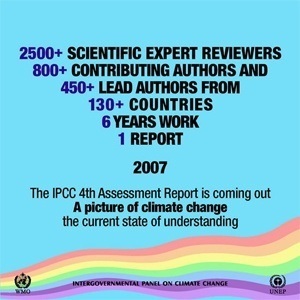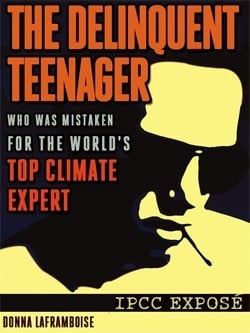I’ve had a bad experience with a FoxNews reporter in the past. Which was why Charles Couger apologized for an offense he had nothing to do with and promised to behave professionally.
His story appeared earlier today and is titled Leaked UN climate report slammed for citing WWF, Greenpeace. The Intergovernmental Panel on Climate Change (IPCC) is a big, complicated bureaucracy. Anyone who hasn’t been studying it for a while has a difficult time making sense of things. Couger has done an admirable job.
The full text of our e-mail interview follows, with a typo corrected and links to my book inserted:
1. Is the WWF an “activist” group?
On its website, the WWF invites people to join its “environmental campaigning community” (see here, under the “Take action” subheading). It’s therefore accurate to describe the WWF as
- an activist group
- a pressure group (a term often used in the UK)
- a lobby group – the definition of “lobby” is: “to try to influence the actions of (public officials, especially legislators).”
2. Is the WWF a credible organization for the IPCC to include in its review process?
The WWF has a definite opinion about whether humans are responsible for global warming. It wants more people to think the way it does.
The IPCC claims to be a scientific organization conducting a scientific assessment of the scientific research pertaining to climate change.
In other words, an IPCC assessment is the equivalent of a murder trial. The IPCC’s job is to examine the scientific research and decide whether human-produced carbon dioxide is guilty of causing dangerous global warming. If people with definite opinions are sitting on the jury, the trial is rigged.
3. How large a role did the WWF play in the creation of the IPCC AR5 draft, which leaked in December?
The upcoming AR5 report consists of three main pieces – written by Working Groups 1, 2, and 3. A draft of Working Group 1′s section of the report was ;made public in December. The WWF doesn’t appear to have played any role there. But since the IPCC considers the expert reviewer comments confidential (the comments will only be made public months or years after the report is released), we can’t say for sure that WWF personnel didn’t participate in the review process.
So far, nothing concerning the Working Group 3 section of the report has been leaked. So we don’t know.
Three data sticks worth of Working Group 2 material became public in January. The draft of the Working Group 2 section of the report currently includes, amongst its list of references, nine separate publications produced wholly or in part by the WWF.
An embarrassing IPCC error occurred the last time around because the IPCC got its information about Himalayan glaciers from a WWF-produced publication. You’d think, therefore, that the IPCC would have learned its lesson, that it would have told its authors not to rely on these sorts of publications. The presence of nine WWF publications in the draft demonstrates that this isn’t the case.
4. You’ve also written about the assessment review process, in which the IPCC looks for comments from other organizations. Can you explain how this process works?

official 2007 IPCC graphic
Each IPCC Working Group writes a draft report – called the Zero Order Draft. It is circulated, mostly to IPCC insiders, and feedback is collected.
The Working Group then writes another draft – called the First Order Draft. That one is circulated to IPCC insiders, but also to a pool of people the IPCC has traditionally described as external “scientific expert reviewers.” One must register with the IPCC, and agree to keep the draft confidential, in order to be such a reviewer. It’s reasonable to expect that people described by the IPCC as “scientific expert reviewers” actually are experts who have scientific credentials.
After those people submit their feedback, a Second Order Draft is written. It is circulated to IPCC personnel, to the external expert reviewers, and also to governments – all of whom provide feedback before the final version of the report is produced. (The membership of the IPCC appears to be identical to the membership of the United Nations. The IPCC is a UN body.)
The Working Group 2 data sticks contain all the reviewer comments pertaining to Working Group 2′s Zero Order and First Order draft. These reveal that two WWF employees, as well as employees from other activist groups, were designated as “scientific expert reviewers” by the IPCC.
Many of the comments these people submitted are devoid of scientific content. They don’t behave like real expert reviewers who have a sincere interest in strengthening the scientific basis of the report. What we see here is the WWF (and other activist organizations such as International Rivers, Conservation International, and the Alliance of Small Island States) using the IPCC’s expert review process as a behind-the-scenes lobbying opportunity. Again and again, these WWF employees urge IPCC authors to base their analysis on WWF publications – the kind of publication that has caused the IPCC so much grief in the past.
5. If these “activist” organizations are involved, does that compromise the credibility of the IPCC review?
As I say above, what’s going on here is similar to a murder trial. The process is supposed to be fair and impartial.
If some members of the jury already hold a strong opinion – if their employment with activist organizations depends on them holding that opinion – they aren’t going to examine the evidence with an open mind.
If this were a criminal trial, we’d have no confusion. We’d look at the fact that the IPCC allows activists to participate and conclude that the jury has been rigged, that the verdict was predetermined from the start.
6. Do you think pressure from activist groups actually influences the development of the IPCC report?
The fact that the IPCC doesn’t keep itself at arms length from activists and activist organizations gives the game away. This isn’t a beyond-reproach scientific body. It isn’t doing everything it can to appear professional, rigorous, fair, and impartial.
Climate change is supposed to be the most important issue of our time. Surely the people examining it on behalf of the UN should meet high standards.
7. The IPCC assessment reviews are often used as a scientific basis for policy decisions. Are the assessment reviews based on solid science?
Not always. My book describes a number of instances in which the peer-reviewed scientific literature concludes X – and IPCC authors instead chose to cite non-peer-reviewed (grey literature) to make the case for the Y.

8. Do you consider the IPCC assessment reports more political or more scientific?
The IPCC dresses up political points-of-view in scientific clothing. Which means that both politicians and the public are being misled.
9. The IPCC has published four Assessment reviews, and leaked a draft of the fifth one. Historically, how much has the IPCC relied on activist organizations for its data? Is this a new phenomenon? If not, has the IPCC scaled back (or increased) its reliance on these types of organizations?
Drafts of 73% of the chapters in the IPCC’s 5th Assessment Report (AR5) have now been leaked. The first leak was by Alec Rawls, a Working Group 1 expert reviewer. After the review process finished, and the deadline for submitting comments had passed, he leaked the text of Working Group 1′s Second Order Draft.
The Working Group 2 data sticks came into the possession of a journalist, yours truly, via an IPCC whistleblower – someone inside who obviously thinks the public has a right to know what’s going on behind closed doors. That was AR5 leak number two.
The salient point is not how much IPCC data can be traced to activists. The real issue is that all of the evidence is being evaluated either by people who embrace an activist worldview, or who don’t consider an activist worldview to be at odds with rigorous science.
The IPCC has, in the past, permitted employees of activist organizations to serve as authors as well as expert reviewers. It has relied on activist publications to draw its conclusions and to make its arguments. The chairman of the IPCC writes forewords for activist publications.
This means that the IPCC sees nothing wrong with activist perspectives. That’s what gives the game away. That’s what tells us that what’s going on at the IPCC is not science.
Only after the final version of AR5 has been published (and the names of all the contributing authors and expert reviewers revealed) will it be possible to know whether activist participation in the IPCC appears to have increased or decreased.
However, please note that no systematic examination of the IPCC and activists has ever been conducted – by me or anyone else. Many of my discoveries have been accidental.
Thousands of people have been involved in each of the recent IPCC assessment reports. Checking out all those people for activist connections is a huge, time-consuming task.
Read more about the recent leak of three IPCC data sticks here: The Secret Santa Leak (Part 1)
Are a Third of IPCC Review Editors Missing in Action? (Part 2)
Cogs in the Climate Machine (Part 3)





